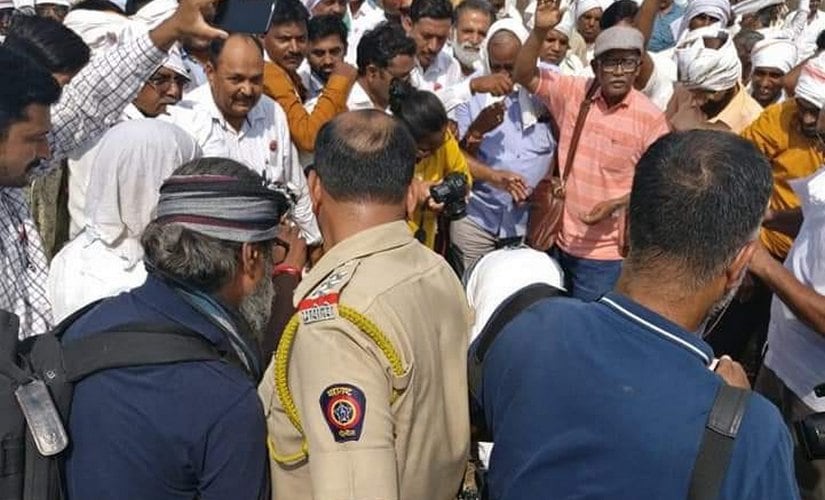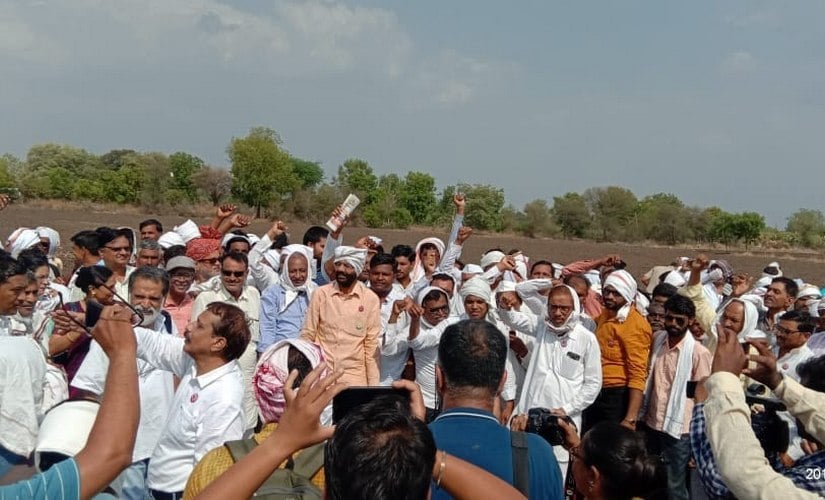Jagan Patil, a farmer from Tembhurni village in Jalna district of Maharashtra, has switched from the genetically modified (GM) BT cotton to its unapproved variant called as Herbicide Tolerant (HT) BT cotton in his 100-acre farm since 2017. “I procure the HTBT cotton seeds from Gujarat where the law is not so stringent as it is in Maharashtra and other southern states. The crop has minimized my labour cost as there are hardly any weeds to be removed. My yield has gone up from nearly 12 quintals per acre to about 15 quintals per acre, fibre quality has also improved,” Patil said.
Patil is among thousands of Maharashtra farmers who sowed HTBT cottonseed known as Roundup Ready Flex (RRF) which is not yet approved by the Government of India. The RRF developed by Monsanto is a third-generation genetically-modified technology for cotton which provides the plant strength to protect itself from weed-killer called glyphosate.
At present, cotton is the only GM crop permitted by the GM crop regulator - Genetic Engineering Appraisal Committee (GEAC) to be grown in India. The Committee has not cleared the herbicide-tolerant BT cotton so far. Cultivation, possession, sale and transport of unapproved seeds invites a fine of Rs 1 lakh and five years’ imprisonment. [caption id=“attachment_6808871” align=“alignnone” width=“825”]  Thousands of Maharashtra farmers sowed HTBT cottonseed known as Roundup Ready Flex (RRF) which is not yet approved by the Government of India, as a form of protest. Image procured by Kanchan Srivastava[/caption] “Unapproved HTBT cotton seeds are being sold secretly by agents at Rs 1,200 to Rs 1,500 for a packet of 450 grams. BT cottonseed is available at Rs 730 but more and more farmers are adopting the latest technology because it is cost effective and the yield is better,” says farmer leader and chief of Swabhimani Shetakri Sanghatna Raju Shetti. A field survey conducted by the Central Institute of Cotton Research in Wardha, Chandrapur, Nagpur and Yavatmal districts of Vidarbha region of Maharashtra found that over 40 percent cotton samples belonged to unapproved RRF. RRF is the same GM cotton trait that Mahyco (Maharashtra Hybrid Seeds Company), the Indian subsidiary of global seed giant Monsanto, was seeking approval from GEAC for its commercial use in 2013 but withdrew the application in August, 2016 allegedly protesting against the government’s flip-flop over the patents and a move to cut its royalties. Over 15 percent of farmers in cotton growing states like Maharashtra, Gujarat, Andhra Pradesh and Telangana have switched to the HTBT variant, a survey conducted by the Centre found in 2017. The main source of these seeds is largely unknown though Andhra has banned some firms suspecting their involvement in the illegal sale of the HTBT cottonseeds. Responding to a questionnaire sent via email about the source and pending approval of these HTBT cottonseeds, Mahyco’s vice-president, corporate communication, Subbarao Appemane said, “We will not be able to respond to your queries at this point of time.” A senior scientist at the Indian Council of Agriculture Research said, “Both Monsanto and Bayer had conducted field trials on HTBT cotton between 2007-09 in India. But we don’t know if the currently available seeds belonged to those tests or smuggled from abroad.” Is this another vicious cycle? Farmers’ organisations in Maharashtra, especially those in Vidarbha, are alarmed by the spread of the illegal RRF which supposedly offer the twin advantage — bollworm resistance and herbicide tolerance. In comparison, the approved BT variety (Bollgard 1 and 2) are only bollworm-resistant which became ineffective against the pest over the years bleeding the cotton farmers. The region is known for the large numbers of suicides by cotton farmers in the past 15 years. Farm activists have blamed the failure of BT crops for the same. “Farm incomes dwindled due to failure of BT crops, adverse climatic conditions, poor irrigation facilities and rising input costs. Hence, distressed farmers are swayed by the propaganda of some farmers outfits supported by seed companies. We don’t know whether HT cotton is safe for the environment or will remain herbicide-tolerant for long-term,” said Dr Ashok Dhawale, CPIM leader and president of All India Kisan Sabha emphasising on the need for government backing for the large-scale shift to HTBT cotton.
Suspecting nexus between politicians and seed companies, Dhawale said, “Untested cultivation of such a crucial crop by desperate farmers may cause more harm than good. Modi government seeks to escape from its responsibility. They must either approve it after proper studies or prosecute the erring seed companies.”
Apparently, no evaluation is undertaken on the environmental impact, biosafety or other implications, if any, from herbicide-tolerant cotton. Devinder Sharma, an agriculture policy expert, feels that latest variant is going the same way as the BT cotton. “Farmers had started growing BT cotton after being encouraged by activists and lobbyists and then the government approved it in 2002. The HTBT variety may also get its way sooner or later,” says Sharma. [caption id=“attachment_6808891” align=“alignnone” width=“825”]  The protesting farmers have sought to assert that HTBT is a part of their rights. Image procured by Kanchan Srivastava[/caption] Health and superweed concerns Yogeshwar Shukla, the chief scientist at CSIR-Indian Institute of Toxicology Research Lucknow, emphasises on more research to rule out the health concerns related to third-generation GM cotton cultivation. Monsanto’s herbicide-Roundup whose active ingredient is Glyphosate is classified as “probably carcinogenic” by the World Health Organisation’s International Agency for Research on Cancer (IARC) led to a heated debate in US and European Union. Following the report, US courts have flooded people seeking compensations for cancer with lawsuits. In 2016, the European Food Safety Authority (EFSA) said glyphosate is “unlikely” to cause cancer, yet countries like Austria are phasing out glyphosate. Scientists also worry about a possible evolution of superweeds and destruction of “good weeds” by prolonged use of glyphosate, a precarious situation which might turn out to be a disaster for agriculture. It is farmers’ right, say activists The supporters of HTBT cotton insist the technology must reach to farmers. “Since no other option is available for cotton farmers, there is no harm in trying the upgraded seed. But the ruling Bhartiya Janta Party (BJP) and other right-wing outfits are ideologically opposed to newer technologies which has led to this indecisiveness. This is damaging the agriculture sector and helping the unscrupulous trade,” says Raju Shetti. He adds that indecision has led to surge in seed cost, farmers are even being cheated with the mixed seeds. Anil Ghanwat, national president of Shetkari Sanghatana, who held a massive “civil disobedience movement” of farmers in Akola district earlier this week to assert that HTBT is farmers’ right, said, “India imports Canola oil from Canada, which is obtained from GM seeds. A dozen GM crops like maize, soya, cotton have been planted across the world and millions of people and livestock have been eating these for the past two decades. There is no evidence of any adverse impact on their health. Why can’t Indian farmers grow HTBT cotton?” he said. He added that HTBThas been grown commercially since 1995 globally. Australia, Canada, and the United States are among countries which have permitted cultivation of herbicide-tolerant cotton after assessing its “impact on human and environment and concluding no significant impact to the environment or humans.” Maharashtra cautious as Assembly polls near, BJP-led government’s stand unclear BJP-led government in Maharashtra has adopted cautious approach over the controversy as Assembly polls are due in October. No one would like to hurt the farmers’ sentiments at this juncture as they constitute a significant vote bank, a BJP leader admitted on the conditions of anonymity. State finance minister Sudhir Mungantiwar said, “The government will take legal action against the people involved in illegal trade of HtBt cottonseeds.” Sadabhau Khot, minister of state for agriculture, Maharashtra earlier said, “Famers need to be educated on this issue. The government is ready to take a delegation to those countries where the crop is banned and seek reports from these nations.” Purushottam Rupala, Union minister of State for agriculture, Panchayati Raj and Farmers Welfare, says, “The government has no role in this issue. This is a scientific matter under the purview of GEAC. As far as violation of law is concerned, states should take action.”


)

)
)
)
)
)
)
)
)



